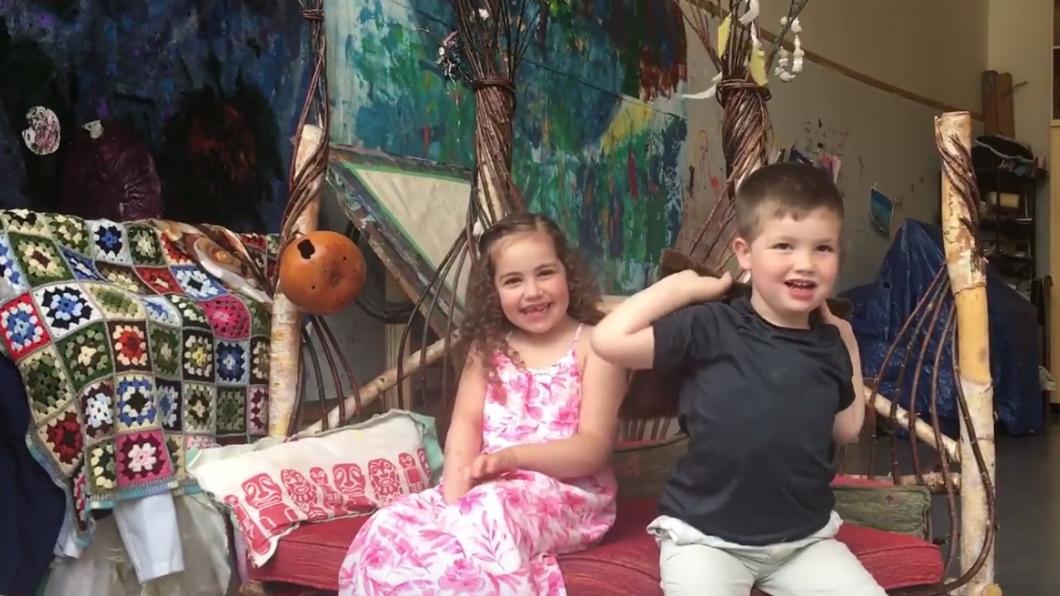
Holland Bloorview offers helping hand for young stroke survivor
"Mommy, Sydnee doesn’t want to play with me anymore…”
That’s what Mackenzie Buckland’s four-year-old son, Rory, said to her one February afternoon.
Not thinking much of it, Mackenzie went to check on her daughter. She was standing on the couch and trying to talk but couldn't form words.
Then Mackenzie noticed the right side of her face began drooping.
“I said to (my husband), Blair, ‘There’s something wrong….it’s like she’s having a stroke!’”
Sadly, six-year-old Sydnee was having a stroke.
However the Midland, Ontario, couple didn’t know it at the time. They rushed Sydnee to their local hospital that was minutes away.
When they arrived, the entire right side of Sydnee’s body went limp. “She couldn’t do anything other than lay there,” said Blair.
Suddenly, the entire family was in a helicopter on their way to the hospital.
In a very short period of time, Sydnee had suffered three strokes in rapid succession. Needless to say, Mackenzie and Blair were confused, scared and felt totally helpless.
“We didn’t know it was possible for children to have a stroke,” said Mackenzie. “I don’t think anyone we knew thought it was possible,” added Blair.
It is possible. In fact, in Canada there are more than 10,000 children (0–18 years) living with stroke.
Healing of the mind and body
Sydnee spent a month at Sick Kids before arriving at Holland Bloorview in March. She arrived in a wheelchair and couldn’t say anything other than “hello.”
Sydnee was enrolled in physiotherapy, occupational therapy and speech therapy and over the next few months Mackenzie and Blair watched their daughter come back to life.
Within the first week she began to move her legs. In less than a month, she was out of her wheelchair and able to stand on her own and walk short distances.
By six weeks she ditched the wheelchair completely.
Her speech also gradually came back, and her parents began to see their daughter express herself the way she once had. But it wasn’t an easy road.
“She had to relearn making sounds, never mind words…she had to start speaking from scratch,” said Blair.
While these programs and services helped Sydnee get moving and talking again, her parents believe what she looked forward to most was her sessions with a Child Life Specialist who helped Sydnee better understand what happened to her.
(A Child Life Specialist is a pediatric health care professional who works with kids and families to help them cope with the emotional challenges of hospitalization, illness, or disability.)
Sydnee’s Child Life Specialist helped keep her outlook positive. “Some days she would have meltdowns, and the Child Life sessions helped raise her spirits,” said Blair.
Helping Hand program gets thumbs up
Sydnee was discharged at the end of June. The family went home for two weeks and then returned so that Sydnee could take part in the hospital’s outpatient “Helping Hand” program.
Helping Hand is a Modified Constraint Induced Movement Therapy program that involved casting her good hand, so that she was encouraged to use her weaker hand. The program also included two-handed activities to encourage Sydnee to use both hands together.
Progress was slow, but gradual. “The Helping Hand program has helped for sure. She’s thinking about using her hand more than before when she would forget about it and just use her left hand,” said Mackenzie, who smiles when she watches Sydnee do the simplest things with her right hand, like open up a marker.
“There are still some days that are frustrating, but for the most part, Sydnee’s pretty happy,” continued Mackenzie, who had mixed feelings about returning home.
“Holland Bloorview is like a second family,” said Mackenzie. “But it’s hard to leave because when you are there, you don’t have to worry about the outside world and what people are going to think, and what she’s going to have to go through back at school with children who don’t understand.”
“Here, everyone does, and we always felt welcome.”
